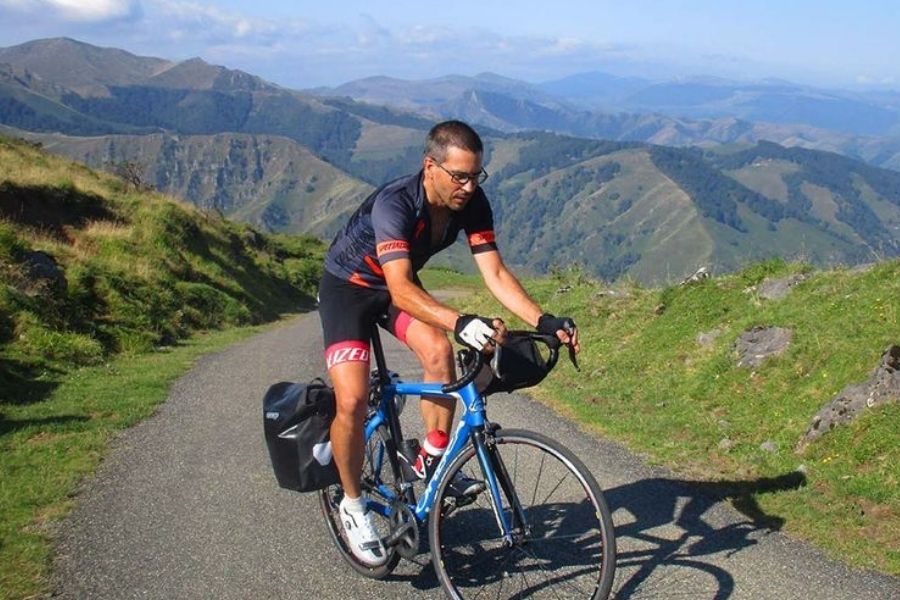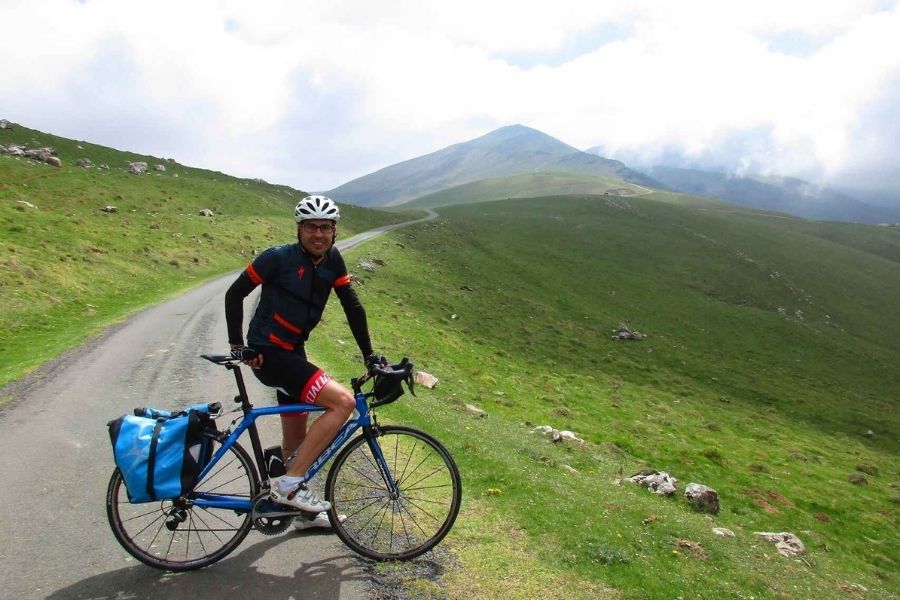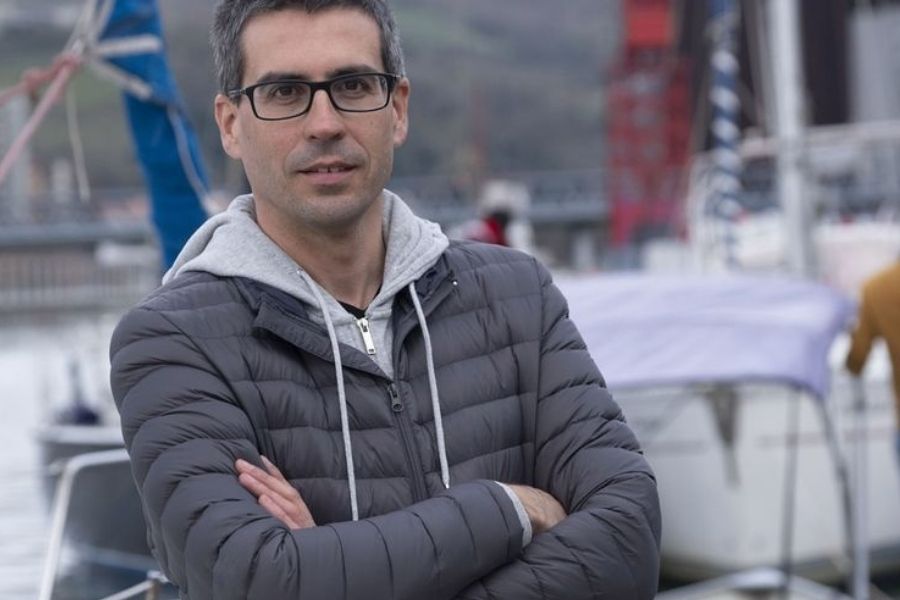📺 For a start. First of all, do you think we know our protagonist in his most sporty facet? Give it to Play and discover the importance of the bicycle in your daily life.
How does that concern arise to tell stories related to the bicycle? I have always liked the bike and I have practiced cycling from kid. When I opted for journalism and writing, I saw that it was a wonderful ally to travel and tell stories, an excellent raw material. The sports adventures of 80 or 100 years are very striking and the range of characters is enormous: from the luminous to the darkest. From the most generous of the heroes to the biggest cheater. A human landscape that for literature is a treasure. I always wanted to tell great cycling history, both epic and tragic, comic and even ridiculous. And that all of them serve to understand the social and political context of countries such as France and Italy: wars, dictatorships, the presence of women in cycling ... For the rest, writing and pedaling have always gone together. In fact, to write better I need to leave every two or three days to clear my head.
 How is the process of creating your books about cycling?
The goal is to discover HISTORIONS. The research process is hilarious and I enjoy a lot. You always have some preconceived ideas, but it is a world full of surprises. It is a constant discovery that I love to share with the reader.
In the newspaper, you find testimonies, chronicles and fabulous episodes that you do not know. Sometimes, it happens that what they have told you how myth really happened very differently.
The Book of Giro has allowed me to interview cyclists as a marine Lejarreta or Miguel Mari Lasa. I was also talking to Florinda Parenti about the female cycling of the 60s and it is one of the most amazing stories I have met.
What are the characters that have impacted you most in your investigations?
On the one hand, there are the great champions that everyone can know. But then there are fascinating secondary characters. We can talk about Parenti, or Luigi Malabrocca, a cyclist who competed to be the last of the turn and take the Maglia Black
But there is an especially powerful character that I speak in Lead in pockets: Roger Walkowiak. A cyclist who won the 1956 tour, but who regretted it all his life.
Walkowiak was a second -line corridor that this year got into escapes in the first week of the tour. He accumulated a great advantage and resisted the attacks of the favorites. However, criticism lashed out at him: that if it had been a very lazy tour, that if a winner like him discredited the race ...
He suffered so much that he retired very young from cycling. Being very old, he appeared on French television almost sobbing. He didn't want to talk about the tour he won or his wife because for him it was a "wound." It's amazing how to achieve the maximum can destroy life. It's like Greek tragedy.
How is the process of creating your books about cycling?
The goal is to discover HISTORIONS. The research process is hilarious and I enjoy a lot. You always have some preconceived ideas, but it is a world full of surprises. It is a constant discovery that I love to share with the reader.
In the newspaper, you find testimonies, chronicles and fabulous episodes that you do not know. Sometimes, it happens that what they have told you how myth really happened very differently.
The Book of Giro has allowed me to interview cyclists as a marine Lejarreta or Miguel Mari Lasa. I was also talking to Florinda Parenti about the female cycling of the 60s and it is one of the most amazing stories I have met.
What are the characters that have impacted you most in your investigations?
On the one hand, there are the great champions that everyone can know. But then there are fascinating secondary characters. We can talk about Parenti, or Luigi Malabrocca, a cyclist who competed to be the last of the turn and take the Maglia Black
But there is an especially powerful character that I speak in Lead in pockets: Roger Walkowiak. A cyclist who won the 1956 tour, but who regretted it all his life.
Walkowiak was a second -line corridor that this year got into escapes in the first week of the tour. He accumulated a great advantage and resisted the attacks of the favorites. However, criticism lashed out at him: that if it had been a very lazy tour, that if a winner like him discredited the race ...
He suffered so much that he retired very young from cycling. Being very old, he appeared on French television almost sobbing. He didn't want to talk about the tour he won or his wife because for him it was a "wound." It's amazing how to achieve the maximum can destroy life. It's like Greek tragedy.
 Lead in pockets It is your first book about cycling and has already become almost a classic. Surprised?
Lead in pockets It is a book with a very peculiar story because it has not stopped growing. The first version came out in 2005 following a literature contest organized by the newspaper Marca. In 2012 we reissued it with K.O. And since then it has had a great projection.
I remember a presentation of the book in Santander. I was approached by a lady of almost 100 years and it turns out that she was the woman of Vicente Trueba, from La Pulga de Torrelavega, who was the first king of the Mountain of the Tour, in 1933. He shared with me a lot of cuts and memories, and I had no choice but to build a new chapter of the book.
Speaking of your book about the turn, your story ends with Froome and company. But what would that chapter would like to add below?
I have it clear: one about Mikel Landa. There are characters that create stories even if they are not winners. To start, Landa is a guy with a very peculiar relationship with Italy. In addition, he is a cyclist with a curious creation of expectations that do not usually be met. I would like to know how he takes it.
I think Landa is a person who reflects on his role circus of cycling, which includes the show. I am struck by your character, how it manages disappointment. He himself feeds those expectations and does not fear.
Lead in pockets It is your first book about cycling and has already become almost a classic. Surprised?
Lead in pockets It is a book with a very peculiar story because it has not stopped growing. The first version came out in 2005 following a literature contest organized by the newspaper Marca. In 2012 we reissued it with K.O. And since then it has had a great projection.
I remember a presentation of the book in Santander. I was approached by a lady of almost 100 years and it turns out that she was the woman of Vicente Trueba, from La Pulga de Torrelavega, who was the first king of the Mountain of the Tour, in 1933. He shared with me a lot of cuts and memories, and I had no choice but to build a new chapter of the book.
Speaking of your book about the turn, your story ends with Froome and company. But what would that chapter would like to add below?
I have it clear: one about Mikel Landa. There are characters that create stories even if they are not winners. To start, Landa is a guy with a very peculiar relationship with Italy. In addition, he is a cyclist with a curious creation of expectations that do not usually be met. I would like to know how he takes it.
I think Landa is a person who reflects on his role circus of cycling, which includes the show. I am struck by your character, how it manages disappointment. He himself feeds those expectations and does not fear.
 Do secondary characters seduce you more than the great legends of cycling?
Depends. There are feats of winners that can even be boring.
I am very interested in the characters with chiaroscuros. For example, Armstrong: a heroic story that ended in the greatest trap in the history of sport.
Pantani has a very hard and very sad story. I deepened a lot in their letters, in the books published in Italy on his figure ... it is the terrible story of a machine that devours a human being. He died with 34 years of overdose, alone, in a hotel in winter ...
Do secondary characters seduce you more than the great legends of cycling?
Depends. There are feats of winners that can even be boring.
I am very interested in the characters with chiaroscuros. For example, Armstrong: a heroic story that ended in the greatest trap in the history of sport.
Pantani has a very hard and very sad story. I deepened a lot in their letters, in the books published in Italy on his figure ... it is the terrible story of a machine that devours a human being. He died with 34 years of overdose, alone, in a hotel in winter ...
📺 Any time passed was better? The author speaks in this video of the fascination caused by the cycling of the old days.
Do you think that any past time (cyclist) was better? Time is a key element. Any story of 100 years ago Flipa. It was all very exotic: the bikes were very clear, the stages were 400 km, the gravel roads, the snowfall ... the cyclists were quite gross, wild. Tremendous characters that no longer exist today. Everything that happened before catches our attention. They usually tell me that cycling will never give stories like those before, but I disagree. Who could think that a turn in October would be played because of a worldwide pandemic? Then you have characters like Ullrich, who a few years ago was a great cyclist and today he is about to fall through a vital ravine. You have a thousand stories that will surprise in 20 years. What seems everyday today, will be surprising. I have no doubt that cycling will continue to create great stories.
 In addition to writing about cycling, you are a good bike fan. In what place have you felt more intensely that atmosphere of cult of our sport?
These years I have traveled a lot in Italy and I love the perception they have of cycling as cultural, landscape and historical heritage. I give you an example: the Strade Bianche, in La Toscana. You are going to Siena and those same gravel roads for which professionals are competing are prepared for the cyclist to enjoy.
And I speak of cycling in the purest sense of knowing a territory to pedals. It is a territory in which everything is facilities to walk by bike. In addition, they cultivate that evocation of cycling of another era.
What if you had to recommend a unique place?
The Sormano Wall, in Lombardy. A road built exclusively to make cyclists suffer and harden the Lombardy turn in the sixties. A 2 km stretch that was risen, remodeled by landscapers, decorated with legendary cyclists phrases ... They have made it a mythical scenario of cycling and fans come on pilgrimage. That conscience is the one that misses here. We really like competition cycling, but we neglect our own history. In Lombardy, in Los Dolomitas, in La Toscana ... In all those places you find constant references to the turn, to Pantani, to Coppi, to Bartali ...
In addition to writing about cycling, you are a good bike fan. In what place have you felt more intensely that atmosphere of cult of our sport?
These years I have traveled a lot in Italy and I love the perception they have of cycling as cultural, landscape and historical heritage. I give you an example: the Strade Bianche, in La Toscana. You are going to Siena and those same gravel roads for which professionals are competing are prepared for the cyclist to enjoy.
And I speak of cycling in the purest sense of knowing a territory to pedals. It is a territory in which everything is facilities to walk by bike. In addition, they cultivate that evocation of cycling of another era.
What if you had to recommend a unique place?
The Sormano Wall, in Lombardy. A road built exclusively to make cyclists suffer and harden the Lombardy turn in the sixties. A 2 km stretch that was risen, remodeled by landscapers, decorated with legendary cyclists phrases ... They have made it a mythical scenario of cycling and fans come on pilgrimage. That conscience is the one that misses here. We really like competition cycling, but we neglect our own history. In Lombardy, in Los Dolomitas, in La Toscana ... In all those places you find constant references to the turn, to Pantani, to Coppi, to Bartali ...













